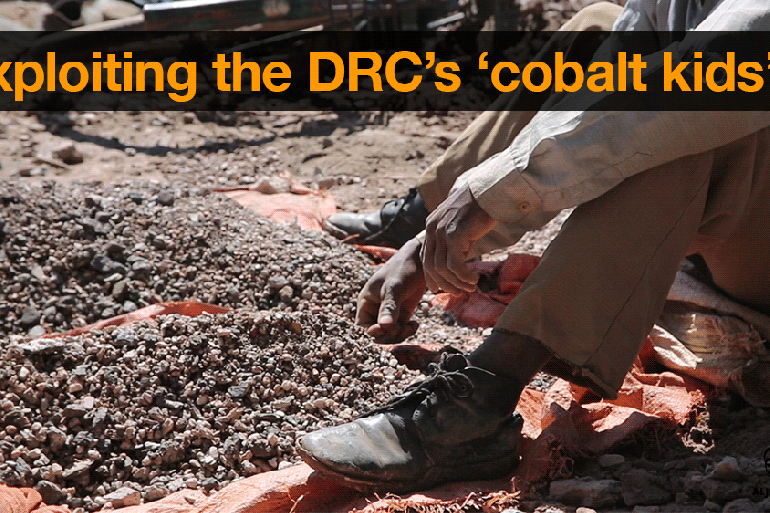Report highlights plight of DRC’s ‘cobalt children’
Western firms turn blind eye as child miners toil in dangerous conditions for precious “battery” mineral, Amnesty says.

![Cobalt GIF [Al Jazeera]](/wp-content/uploads/2016/01/b7198f38a36e4abd95eb206f8159a2ee_18.jpeg)
Children as young as seven are being sent down dangerous mines in the Democratic Republic of the Congo to extract highly valued cobalt for batteries to power the world’s electronic devices.
Keep reading
list of 4 itemsTunisia: The migration trap
Children of the Darien Gap
Girls in Africa have every right to be children
Laptops, mobile phones and electric cars all require the mineral for lithium batteries, and half the world’s cobalt supply is found in the DRC, a report by Amnesty and the NGO Afrewatch published on Tuesday said.
In 2014, about 40,000 children worked in mines across the country, according to UNICEF.
At least 80 artisanal miners died underground in southern Congo between September 2014 and December 2015, but that number could be far higher, according to the report.
|
|
| Risking it all – Hazardous trucking in DR Congo |
After Congolese children and adults risk their lives in the mines, cobalt is then sold to Chinese and South Korean battery manufacturers who supply major tech and car companies such as Apple, Microsoft, Samsung, Sony, and Volkswagen, it said.
“We literally followed the sacks and trucks with the cobalt mineral from the mines to the marketplaces and to the distribution to companies,” said Mark Dummett, who conducted research for Amnesty in DRC.
“There is little transparency in the production chains … At the end of the line, the Western companies who sell these devices can easily say they are unaware of where the raw materials come from,” Dummett said.
Artisanal mining in DRC is often done by hand, using the most basic tools. Children work up to 12 hours a day carrying heavy loads, while earning between $1 and $2 a day.
The report quoted one child identified as Paul, 14, who said he often spends 24 hours down in the tunnels. “I arrive in the morning and leave the following morning.”
Francois, a miner who was sorting stones with his 13-year-old son, told researchers they had to do what was necessary to survive.
“It is difficult to afford the school fees, it is hard to afford food. We work because we have to – because there are no jobs. Give us jobs and we’ll look after our children properly.” Francois was quoted as saying.
The hand-dug mines – tens of metres underground – often have little tunnel support and are poorly ventilated.
One woman described having to carry 50kg sacks of cobalt ore. “We all have problems with our lungs and pain all over our bodies,” she said in the report.
READ MORE: The losing battle against conflict minerals
Frank Poulsen, the Danish filmmaker, directed the documentary Blood in the Mobile in 2011, in which he tried to trace his Nokia mobile phone to the Congo mines.
“The situation in Congo has changed from when I was there to film the documentary, because now there is less conflict,” Poulsen told Al Jazeera.
“But the real problem did not change: companies that extract minerals leave behind poverty and only a small and corrupt elite that profits from the natural resources.”
Poulsen said it was up to the major Western companies to take responsibility for the exploitation of the Congolese miners.
“Of course big companies on the far end can be more transparent – the problem is they do not want to be,” he said.
“Instead of being socially responsible, they care more about their shareholders and about being competitive, more than they care about child labour in Congo. That is how simple it is.”
|
|